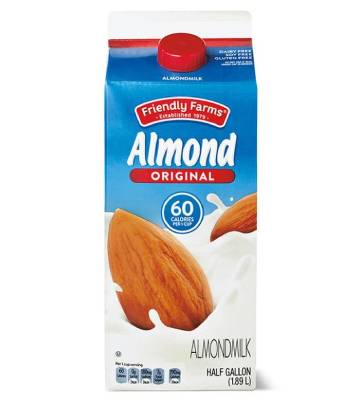Food Nutrition Facts
Nutrition Facts For
Milk - Almond - Original
Portion Size: 1 Cup
| Nutrient | Value | % Daily Value* |
|---|---|---|
| 40.0 kcal | 2% | |
| 3.5 g | 1% | |
| 0.0 g | 0% | |
| 0.0 mg | 0% | |
| 150 mg | 7% | |
| 160.0 mg | 5% | |
| 1.0 g | ||
| 0.0 g | ||
| 0.0 g | ||
| 1.0 g | ||
| 1.0 g | ||
| Milk Substitute |
*Daily value based on a 2,000 calorie diet. Your daily values may be higher or lower depending on your calorie needs and health goals.
Calculate your daily calorie needs here
Nutrition Facts For 1 Cup of Milk - Almond - Original

Almond milk, a popular plant-based beverage, offers a variety of nutritional benefits. It's naturally low in calories and saturated fat, making it a good choice for those watching their weight or cholesterol intake. Almond milk is also a good source of vitamin E, an antioxidant that supports healthy skin and eyes. Additionally, many commercially available almond milks are fortified with calcium and vitamin D, crucial nutrients for bone health. For individuals with lactose intolerance or dairy allergies, almond milk provides a safe and delicious alternative to traditional cow's milk.
Beyond its nutritional advantages, almond milk is also a versatile ingredient in the kitchen. It can be used in the same ways as cow's milk, from adding creaminess to smoothies and lattes to serving as a base for cereal or oatmeal. Its mild, slightly nutty flavor complements a variety of dishes, both sweet and savory. Furthermore, almond milk is generally considered to be more environmentally friendly than dairy milk, requiring less water and land to produce. This makes it a sustainable choice for those looking to reduce their environmental impact.







